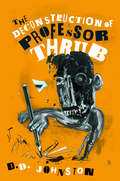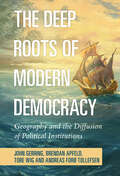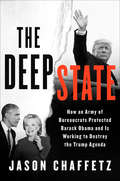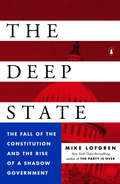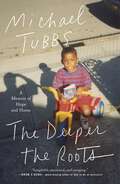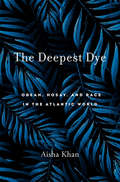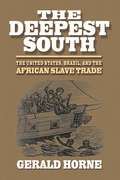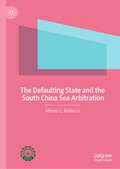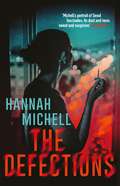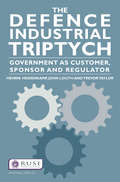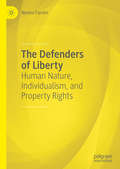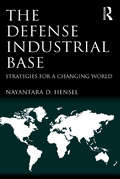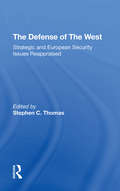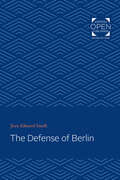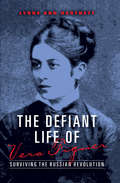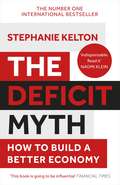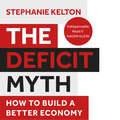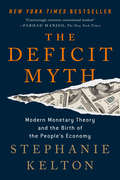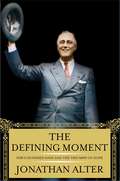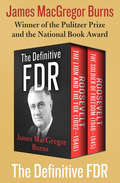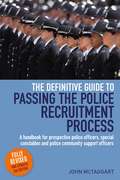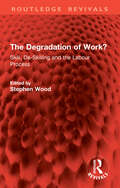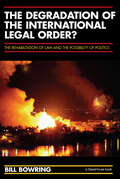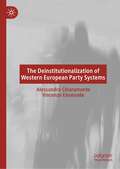- Table View
- List View
The Deconstruction of Professor Thrub
by D. D. JohnstonA dopamine-enhanced PORTERHOUSE BLUE ... raw and unexpurgated humour ... such a determinedly extraordinary book.' - The Morning Star. A biting comedy of love, desperation and existence THE DECONSTRUCTION OF PROFESSOR THRUB offers a thrilling ride into the world of a major new writer. A young student tracks the biography of Elsie Stewart from her job as a London maid and to the Spanish Civil War. The story hurtles back into the maelstrom of Ukrainian revolutions, while the narrator is caught in the academic anguish of his university supervisor, the sublimely comic Professor Thrub. True love is tough too, as a young poet leads him through Europe on her own wayward quest. This is a novel that explodes with ideas and characters and events. It's a brazen campus comedy, a medical drama, a radical romp through modern philosophy and twentieth century history, and a cheery ride through the nature of the Scottish Highlands. 'A great book. And very, very funny.' - Georgina Godwin, Monocle Radio.
The Deep Roots of Modern Democracy: Geography and the Diffusion of Political Institutions
by John Gerring Tore Wig Brendan Apfeld Andreas Forø TollefsenThis book explores the deep roots of modern democracy, focusing on geography and long-term patterns of global diffusion. Its geographic argument centers on access to the sea, afforded by natural harbors which enhance the mobility of people, goods, capital, and ideas. The extraordinary connectivity of harbor regions thereby affected economic development, the structure of the military, statebuilding, and openness to the world – and, through these pathways, the development of representative democracy. The authors' second argument focuses on the global diffusion of representative democracy. Beginning around 1500, Europeans started to populate distant places abroad. Where Europeans were numerous they established some form of representative democracy, often with restrictions limiting suffrage to those of European heritage. Where they were in the minority, Europeans were more reticent about popular rule and often actively resisted democratization. Where Europeans were entirely absent, the concept of representative democracy was unfamiliar and its practice undeveloped.
The Deep State: How an Army of Bureaucrats Protected Barack Obama and Is Working to Destroy the Trump Agenda
by Jason ChaffetzFormer Congressman and current Fox News contributor Jason Chaffetz explains how we ended up with a federal government that actively works to defend the Democratic party and undermine Trump.The liberal media frequently declares the Obama years were free of scandal. They pretend this is true because every office in the Executive Branch worked to slow the information about Hillary’s e-mails, the cover-up of Benghazi, the IRS, and so much more. Yet these same tight-lipped lifers leaked like a sieve once President Trump was sworn in, making it sound like everything he does is the new Watergate.In Deep State, Jason Chaffetz explains how the federal government has grown into a branch of the Democratic party of the past decade or more. The former chairman of the House Oversight committee explains what really happened during the Obama administration, and how we can start to undo the damage caused by this army of liberal sycophants, and build a better future.
The Deep State: The Fall of the Constitution and the Rise of a Shadow Government
by Mike LofgrenThe New York Times bestselling author of The Party Is Over delivers a no-holds-barred exposé of who really wields power in Washington Every Four years, tempers are tested and marriages fray as Americans head to the polls to cast their votes. But does anyone really care what we think? Has our vaunted political system become one big, expensive, painfully scriped reality TV show? In this cringe-inducing expose of the sins and excesses of Beltwayland, a longtime Republican party insider argues that we have become an oligarchy in form if not in name. Hooked on war, genuflecting to big donors, in thrall to discredited economic theories and utterly bereft of a moral compass, America's governing classes are selling their souls to entrenched interest while our bridges collapse, wages, stagnate, and our water is increasingly undrinkable. Drawing on sinsights gleaned over three decades on Capitol Hill, much of it on the Budget Committee, Lofgren paints a gripping portrait of the dismal swamp on the Potomac and the revolution it will take to reclaim our government and set us back on course.From the Hardcover edition.
The Deeper the Roots: A Memoir of Hope and Home
by Michael Tubbs“Insightful, emotional, and enraging. By sharing his story in gripping detail, Michael Tubbs embodies an old feminist tradition whereby the personal is political. He empowers us to fight for equal opportunities for our communities, and encourages us to amass the courage to overcome loss and injustice.” —Ibram X. Kendi, National Book Award-winning author of Stamped fromthe Beginning and How to Be an AntiracistThe making of a visionary political leader—and a blueprint for a more equitable country“Don’t tell nobody our business,” Michael Tubbs’s mother often told him growing up. For Michael, that meant a lot of things: don’t tell anyone about the day-to-day struggle of being Black and broke in Stockton, CA. Don’t tell anyone the pain of having a father incarcerated for 25 years to life. Don’t tell anyone about living two lives, the brainy bookworm and the kid with the newest Jordans. And also don’t tell anyone about the particular joys of growing up with three “moms”—a Nana who never let him miss church, an Auntie who’d take him to the library any time, and a mother, “She-Daddy”, who schooled him in the wisdom of hip-hop and taught him never to take no for an answer.So for a long time Michael didn’t tell anyone his story, but as he went on to a scholarship at Stanford and an internship in the Obama White House, he began to realize the power of his experience, the need for his perspective in the halls of power. By the time he returned to Stockton to become, in 2016 at age 26, its first Black mayor and the youngest-ever mayor of a major American city, he knew his story meant something.The Deeper the Roots is a memoir astonishing in its candor, voice, and clarity of vision. Tubbs shares with us the city that raised him, his family of badass women, his life-changing encounters with Oprah Winfrey and Barack Obama, the challenges of governing in the 21st century and everything in between—en route to unveiling his compelling vision for America rooted in his experiences in his hometown.
The Deepest Dye: Obeah, Hosay, and Race in the Atlantic World
by Aisha KhanHow colonial categories of race and religion together created identities and hierarchies that today are vehicles for multicultural nationalism and social critique in the Caribbean and its diasporas. When the British Empire abolished slavery, Caribbean sugar plantation owners faced a labor shortage. To solve the problem, they imported indentured “coolie” laborers, Hindus and a minority Muslim population from the Indian subcontinent. Indentureship continued from 1838 until its official end in 1917. The Deepest Dye begins on post-emancipation plantations in the West Indies—where Europeans, Indians, and Africans intermingled for work and worship—and ranges to present-day England, North America, and Trinidad, where colonial-era legacies endure in identities and hierarchies that still shape the post-independence Caribbean and its contemporary diasporas. Aisha Khan focuses on the contested religious practices of obeah and Hosay, which are racialized as “African” and “Indian” despite the diversity of their participants. Obeah, a catch-all Caribbean term for sub-Saharan healing and divination traditions, was associated in colonial society with magic, slave insurrection, and fraud. This led to anti-obeah laws, some of which still remain in place. Hosay developed in the West Indies from Indian commemorations of the Islamic mourning ritual of Muharram. Although it received certain legal protections, Hosay’s mass gatherings, processions, and mock battles provoked fears of economic disruption and labor unrest that lead to criminalization by colonial powers. The proper observance of Hosay was debated among some historical Muslim communities and continues to be debated now. In a nuanced study of these two practices, Aisha Khan sheds light on power dynamics through religious and racial identities formed in the context of colonialism in the Atlantic world, and shows how today these identities reiterate inequalities as well as reinforce demands for justice and recognition.
The Deepest South: The United States, Brazil, and the African Slave Trade
by Gerald HorneA diplomatic history examining connections between the United States, Brazil, Africa, and Europe as they relate to the transatlantic slave trade. During its heyday in the nineteenth century, the African slave trade was fueled by the close relationship of the United States and Brazil. The Deepest South tells the disturbing story of how U.S. nationals—before and after Emancipation—continued to actively participate in this odious commerce by creating diplomatic, social, and political ties with Brazil, which today has the largest population of African origin outside of Africa itself. Based on extensive research from archives on five continents, Gerald Horne breaks startling new ground in the history of slavery, uncovering its global dimensions and the degrees to which its defenders went to maintain it.
The Defaulting State and the South China Sea Arbitration
by Alfredo C. Robles Jr.This book focuses on the legal and procedural problems caused by China’s default in the South China Sea Arbitration. Many of these problems arose because in several respects, China departed from the conduct of other defaulting States in cases before the International Court of Justice. The book argues that the Tribunal, confronted with the difficulties of maintaining the balance between two parties in a situation of default, drew on the full range of its powers to ensure that neither China nor the Philippines would suffer from China’s default. Further, the book describes the shortcomings of the submissions of putative amicus curiae. It refutes China’s questioning of the independence and impartiality of the experts and of the judges. In so doing, it explains the expert opinions and the Tribunal ’s assessments of the latter in the areas of satellite imagery, coral reef ecology, and navigational safety, while rebutting the half- truths and counter-truths disseminated by Chinese scholars about the proceedings. The book compares China’s threats to the independence of the Tribunal to its behavior towards Chinese judges. It places China’s accusations of bias against the Tribunal in the context of China’s domestic situation, and concludes that the Tribunal, acting independently and impartially, was able to perform the judicial function, despite China’s default.
The Defections
by Hannah Michell'Stunning' The Times'Excellent' Independent on Sunday'Compelling, haunting and thrilling' David PeaceSeoul, South KoreaMia is an outsider. Half-English, half-Korean, a translator at the British Embassy; she treads a boundary between her roots and the acceptance she desires from the English - especially her boss, Thomas: a married diplomat.Thomas's career is jeopardized by an outrageous indiscretion until Mia comes to his rescue. At first grateful, his feelings are soon complicated by a commission to investigate the background of the woman who has captivated him.Hyun-min is a defector from North Korea, taken in by Mia's family. But he has a secret. One that could shatter Mia's family, her life and the fragile borders around them all.
The Defence Industrial Triptych: Government as a Customer, Sponsor and Regulator of Defence Industry (Whitehall Papers)
by Trevor Taylor John Louth Henrik HeidenkampThe relationship between government and the businesses that contribute towards the defence and security of the state is a critical one; it often underscores a modern state’s foreign policy and sense of place in the world. Yet, despite its clear importance, this subject is underexplored and rarely analysed in a rigorous manner. As a consequence, government defence industrial policies, if they exist at all, often seem somewhat contrived, ill-considered and contradictory. The Defence Industrial Triptych systematically analyses the components and drivers of the relationships that bind a government to its defence industrial base by examining three major case studies: the UK, US and Germany, who between them account for over three quarters of NATO defence spending. The features of their defence industrial relationships –whether common or unique – provide vital lessons for policy-makers, industrialists and the taxpayer. As defence cuts bite across NATO and as the UK approaches the 2015 Strategic Defence and Security Review, the relationships this Whitehall Paper considers are more important than ever.
The Defenders of Liberty: Human Nature, Individualism, and Property Rights
by Neema ParviniThe Defenders of Liberty presents a history of economic liberalism from the Renaissance to the present. It chronicles the tradition of thought that sees human nature as social yet self-interested, methodological individualism as its key analytical tool, and property rights as foundational to a civilised society. In the development of this way of thinking, it considers the contributions of many key thinkers including Niccolò Machiavelli, Thomas Hobbes, John Locke, Richard Cantillon, A.J.R. Turgot, David Hume, Adam Smith, Nassau William Senior, Richard Cobden, Herbert Spencer, Jean-Baptiste Say, Carl Menger, William Stanley Jevons, Gaetano Mosca, Eugen Böhm-Bawerk, Vilfredo Pareto, Phillip Wicksteed, Edwin Cannan, Ludwig von Mises, Lionel Robbins, F.A. Hayek, W.H. Hutt, Milton Friedman, George Stigler, Murray N. Rothbard, James M. Buchanan, and Thomas Sowell. The book contends that liberalism needs to be grounded in realism, and that it has been derailed whenever economists have deviated from an explicitly realist understanding of human nature, individualism and property rights. It argues that the cause of liberalism was compromised by errors in economic reasoning by such major figures as David Ricardo, John Stuart Mill, Alfred Marshall, A.C. Pigou, and John Maynard Keynes. In diagnosing what has gone wrong for liberalism in the twenty-first century, The Defenders of Liberty argues against substituting mathematical abstraction for causal realism; it opposes interventionist central banking; it seeks to recover economic liberalism from social and political liberalism, which are somewhat unrelated schools of thought; it resists a view of human nature rooted in selfishness or atomised individualism; and finally alerts defenders of freedom to the ruthless but effective language games played by their opponents. This book will be of interest to the educated general reader as well as undergraduates and postgraduates in disciplines such as economics, political theory and philosophy.
The Defense Industrial Base: Strategies for a Changing World
by Nayantara HenselThe US and international defense industrial sectors have faced many challenges over the last twenty years, including cycles of growth and shrinkage in defense budgets, shifts in strategic defense priorities, and macroeconomic volatility. In the current environment, the defense sector faces a combination of these challenges and must struggle with the need to maintain critical aspects of the defense industrial base as defense priorities change and as defense budgets reduce or plateau. Moreover, the defense sector in the US is interconnected both with defense sectors in other countries and with other industry sectors in the US and global economies. As a result, strategic decisions made in one defense sector impact the defense sectors of other countries, as well as other areas of the economy. Given her academic, corporate, and Department of Defense experience as a leading economist and policy-maker, Dr. Nayantara Hensel is perfectly positioned to examine the interrelationship between these forces both historically and in the current environment, and to assess the implications for the future global defense industrial base.
The Defense Of The West: Strategic And European Security Issues Reappraised
by Robert Kennedy John M WeinsteinDrawing on their daily involvement with defense issues and their interactions with the military and political elements of the national security community, civilian and military defense analysts in the U.S. Army War Colleger Strategic Studies Institute offer a lucid analysis of the complex mosaic of strategic and European defense issues. Their contributions are probing, balanced, and provocative, designed for students of foreign and defense affairs, as well as for policymakers. In the first section of the book, the offensive and defensive aspects of the strategic balance between the United States and the Soviet Union are examined. Going beyond sterile, static weapons counts, the authors address the relationship between the overall disposition of military forces and deterrence and are attentive to possible future developments, including the impact of new technologies and changing Sino-Soviet relations that are likely to affect the U.S.-USSR relationship. The second section of the book focuses on crucial East-West defense issues within Europe: the balance of conventional and theater nuclear forces, prospects for European arms control, the impact of chemical weapons on deterrence and defense, and the fashioning of an effective nonnuclear NATO defense. The book concludes with a chapter that illuminates U.S.-West European historical and cultural divergences, explaining in a new way the political strains that frequently plague the alliance.
The Defense of Berlin
by Jean Edward SmithOriginally published in 1963. In 1958 Nikita Khrushchev demanded that the United States, Great Britain, and France withdraw from West Berlin. His demands eventually resulted in the division of Germany's capital city through the building of the Berlin Wall. In The Defense of Berlin, Jean Edward Smith discusses Berlin from the time of arrangements set during the war through 1962, with an emphasis on the effect that the crisis of division had on the city.
The Defiant Life of Vera Figner: Surviving the Russian Revolution (Encounters: Explorations in Folklore and Ethnomusicology)
by Lynne Ann HartnettA &“riveting&” biography of a Russian noblewoman turned revolutionary terrorist and accomplice in the assassination of a tsar (The Soviet and Post-Soviet Review). Born in 1852 in the last years of serfdom, Vera Figner came of age as Imperial Russian society was being rocked by the massive upheaval that culminated in the Bolshevik revolution of 1917. At first a champion of populist causes and women&’s higher education, which she herself pursued as a medical student in Zurich, Figner later became a leader of the terrorist party the People&’s Will—and was an accomplice in the assassination of Tsar Alexander II in 1881. Drawing on extensive archival research and careful reading of Figner&’s copious memoirs, Lynne Ann Hartnett reveals how Figner survived the Bolshevik revolution and Stalin's Great Purges and died a lionized revolutionary legend as the Nazis bore down on Moscow in 1942.
The Deficit Myth: Modern Monetary Theory and How to Build a Better Economy
by Stephanie KeltonTHE INTERNATIONAL BESTSELLER'Kelton has succeeded in instigating a round of heretical questioning, essential for a post-Covid-19 world, where the pantheon of economic gods will have to be reconfigured' Guardian'Stephanie Kelton is an indispensable source of moral clarity ... the truths that she teaches about money, debt, and deficits give us the tools we desperately need to build a safe future for all' Naomi Klein'Game-changing ... Read it!' Mariana Mazzucato'A rock star in her field' The Times'This book is going to be influential' Financial Times'Convincingly overturns conventional wisdom' New York TimesSupporting the economy, paying for healthcare, creating new jobs, preventing a climate apocalypse: how can we pay for it all? Leading economic thinker Stephanie Kelton, shows how misguided that question is, and how a radical new approach can maximise our potential as a society. Everything that we've been led to believe about deficits and the role of money and government spending is wrong. Rather than asking the self-defeating question of how to pay for the crucial improvements our society needs, Kelton guides us to ask: which deficits actually matter?
The Deficit Myth: Modern Monetary Theory and How to Build a Better Economy
by Stephanie Kelton'Game-changing ... Read it!' - Mariana MazzucatoIn a world of epic, overlapping crises, Stephanie Kelton is an indispensable source of moral clarity ... the truths that she teaches about money, debt, and deficits give us the tools we desperately need to build a safe future for all. Read it - then put it to use. - Naomi KleinThe leading thinker and most visible public advocate of modern monetary theory - the freshest and most important idea about economics in decades - delivers a radically different, bold, new understanding for how to build a just and prosperous society.Any ambitious proposal - ranging from fixing crumbling infrastructure to Medicare for all or preventing the coming climate apocalypse - inevitably sparks questions: how can we afford it? How can we pay for it? Stephanie Kelton points out how misguided those questions really are by using the bold ideas of modern monetary theory (MMT), a fundamentally different approach to using our resources to maximize our potential as a society.We've been thinking about government spending in the wrong ways, Kelton argues, on both sides of the political aisle. Everything that both liberal/progressives and conservatives believe about deficits and the role of money and government spending in the economy is wrong, especially the fear that deficits will endanger long-term prosperity.Through illuminating insights about government debt, deficits, inflation, taxes, the financial system, and financial constraints on the federal budget, Kelton dramatically changes our understanding of how to best deal with important issues ranging from poverty and inequality to creating jobs and building infrastructure. Rather than asking the self-defeating question of how to pay for the crucial improvements our society needs, Kelton guides us to ask: which deficits actually matter? What is the best way to balance the risk of inflation against the benefits of a society that is more broadly prosperous, safer, cleaner, and secure?With its important new ways of understanding money, taxes, and the critical role of deficit spending, MMT busts myths that prevent us from taking action because we can't get beyond the question of how to pay for it. 'The best book on rethinking economics that anyone will find right now.' - Richard Murphy, Political Economist and author of The Joy of Tax (P)2020 Hachette Audio
The Deficit Myth: Modern Monetary Theory and the Birth of the People's Economy
by Stephanie KeltonA New York Times BestsellerThe leading thinker and most visible public advocate of modern monetary theory -- the freshest and most important idea about economics in decades -- delivers a radically different, bold, new understanding for how to build a just and prosperous society.Stephanie Kelton's brilliant exploration of modern monetary theory (MMT) dramatically changes our understanding of how we can best deal with crucial issues ranging from poverty and inequality to creating jobs, expanding health care coverage, climate change, and building resilient infrastructure. Any ambitious proposal, however, inevitably runs into the buzz saw of how to find the money to pay for it, rooted in myths about deficits that are hobbling us as a country.Kelton busts through the myths that prevent us from taking action: that the federal government should budget like a household, that deficits will harm the next generation, crowd out private investment, and undermine long-term growth, and that entitlements are propelling us toward a grave fiscal crisis.MMT, as Kelton shows, shifts the terrain from narrow budgetary questions to one of broader economic and social benefits. With its important new ways of understanding money, taxes, and the critical role of deficit spending, MMT redefines how to responsibly use our resources so that we can maximize our potential as a society. MMT gives us the power to imagine a new politics and a new economy and move from a narrative of scarcity to one of opportunity.
The Defining Moment: FDR's Hundred Days and the Triumph of Hope
by Jonathan AlterThis is the story of a political miracle -- the perfect match of man and moment. Franklin Delano Roosevelt took office in March of 1933 as America touched bottom. Banks were closing everywhere. Millions of people lost everything. The Great Depression had caused a national breakdown. With the craft of a master storyteller, Jonathan Alter brings us closer than ever before to the Roosevelt magic. Facing the gravest crisis since the Civil War, FDR used his cagey political instincts and ebullient temperament in the storied first Hundred Days of his presidency to pull off an astonishing conjuring act that lifted the country and saved both democracy and capitalism. Who was this man? To revive the nation when it felt so hopeless took an extraordinary display of optimism and self-confidence. Alter shows us how a snobbish and apparently lightweight young aristocrat was forged into an incandescent leader by his domineering mother; his independent wife; his eccentric top adviser, Louis Howe; and his ally-turned-bitter-rival, Al Smith, the Tammany Hall street fighter FDR had to vanquish to complete his preparation for the presidency. "Old Doc Roosevelt" had learned at Warm Springs, Georgia, how to lift others who suffered from polio, even if he could not cure their paralysis, or his own. He brought the same talents to a larger stage. Derided as weak and unprincipled by pundits, Governor Roosevelt was barely nominated for president in 1932. As president-elect, he escaped assassination in Miami by inches, then stiffed President Herbert Hoover's efforts to pull him into cooperating with him to deal with a terrifying crisis. In the most tumultuous and dramatic presidential transition in history, the entire banking structure came tumbling down just hours before FDR's legendary "only thing we have to fear is fear itself" Inaugural Address. In a major historical find, Alter unearths the draft of a radio speech in which Roosevelt considered enlisting a private army of American Legion veterans on his first day in office. He did not. Instead of circumventing Congress and becoming the dictator so many thought they needed, FDR used his stunning debut to experiment. He rescued banks, put men to work immediately, and revolutionized mass communications with pioneering press conferences and the first Fireside Chat. As he moved both right and left, Roosevelt's insistence on "action now" did little to cure the Depression, but he began to rewrite the nation's social contract and lay the groundwork for his most ambitious achievements, including Social Security. From one of America's most respected journalists, rich in insights and with fresh documentation and colorful detail, this thrilling story of presidential leadership -- of what government is for -- resonates through the events of today. It deepens our understanding of how Franklin Delano Roosevelt restored hope and transformed America. The Defining Momentwill take its place among our most compelling works of political history.
The Definitive FDR: Roosevelt: The Lion and the Fox (1882–1940) and Roosevelt: The Soldier of Freedom (1940–1945) (Roosevelt)
by James MacGregor BurnsA Pulitzer Prize–winning historian&’s dramatic biography of Franklin Delano Roosevelt, US president during the Depression and WWII. Franklin Delano Roosevelt was the longest serving president in US history, reshaping the country during the crises of the Great Depression and World War II. James MacGregor Burns&’s magisterial two-volume biography tells the complete life story of the fascinating political figure who instituted the New Deal. Roosevelt: The Lion and the Fox (1882–1940): Before his ascension to the presidency, FDR laid the groundwork for his unprecedented run with decades of canny political maneuvering and steady consolidation of power. Hailed by the New York Times as &“a sensitive, shrewd, and challenging book&” and by Newsweek as &“a case study unmatched in American political writings,&” The Lion and the Fox details Roosevelt&’s youth and education, his rise to national prominence, all the way through his first two terms as president. Roosevelt: The Soldier of Freedom (1940–1945): The Pulitzer Prize and National Book Award–winning history of FDR&’s final years examines the president&’s skillful wartime leadership as well as his vision for postwar peace. Acclaimed by William Shirer as &“the definitive book on Roosevelt in the war years,&” and by bestselling author Barbara Tuchman as &“engrossing, informative, endlessly readable,&” The Soldier of Freedom is a moving profile of a leader gifted with rare political talent in an era of extraordinary challenges.
The Definitive Guide To Passing The Police Recruitment Process (2nd Edition): A handbook for prospective police officers, special constables and police community support officers
by John McTaggartThis book has been written with one very specific objective in mind. It aims to give you, the reader, an in-depth appreciation of the skills and abilities required to pass the police national recruitment tests, including the process for applying to be a Police Community Support Officer (PCSO). <P><P>As you read through this book, you will see the approach is to explain in detail the reasoning and rationale behind each exercise, the mechanics of how each exercise works, and the various limitations that exist within the exercise itself – from the perspective of those who designed it. It is not about making you a better person, although if you follow the principles contained throughout, you may just end up that way! <P> In essence, this book is a ‘how to’ guide to passing the police recruitment system. It aims to give you the best chance of passing through the process successfully.
The Definitive Guide To Passing The Police Recruitment Process 2nd Edition: A handbook for prospective police officers, special constables and police community support officers
by John MctaggartEvery police force in England and Wales uses the same national application form and assessment centre. This book tells you not just about the process, but what you need to do to impress the assessors. Now in a revised new edition to reflect the recent changes in the six core skills by which all police applicants are assessed, it provides:
The Degradation of Work?: Skill, De-Skilling and the Labour Process (Routledge Revivals)
by Stephen WoodOriginally published in 1982 and now reissued with a new Preface by Stephen Wood the contributors of this book discuss the issues surrounding the organization of labour. They use insights from industrial sociology, historical research and Marxist-Feminist debates. In particular they stress that work organization cannot be seen simply as a reflection of the strategy of an omniscient management; any examination of it must involve product and labour markets, technology, trade unionism and, above all, the way in which production systems are jointly created out of the interrelationship between management and workforces. The Degradation of Work? asks if there has been a general de-skilling and routinization of jobs and if ‘skilled’ jobs are really any different from semi-skilled or unskilled ones.
The Degradation of the International Legal Order?: The Rehabilitation of Law and the Possibility of Politics
by Bill BowringProviding the basis for critical engagement with the pessimism of the contemporary age, The Degradation of the International Legal Order? argues passionately for a rehabilitation of the honour of historic events and processes, and of their role in generating legal concepts. Drawing primarily from the Marxian tradition, but also engaging with a range of contemporary work in critical theory and critical legal and human rights scholarship, this book analyses historical and recent international events and processes in order to challenge their orthodox interpretation. What is thus proposed is a new evaluation of international legal principles and human rights norms, the revolutionary content of which, it is argued, turns them from mere rhetoric into powerful weapons of struggle. Accessibly written, but theoretically sophisticated, this original and timely book is intended for critical teachers and students of international law, human rights, and international relations, as well as legal and political activists.
The Deinstitutionalization of Western European Party Systems
by Alessandro Chiaramonte Vincenzo EmanueleThis book offers a systematic and far-reaching account of party system institutionalization in Western Europe. Drawing upon a wide array of data and through a comparison of 20 countries from the end of WWII to 2019 across three arenas of party competition (electoral, parliamentary, and governmental ones), the empirical analysis shows that, over the past decade, the level of institutionalization in the Western European party systems has dramatically declined compared with previous decades. Electoral, parliamentary, and – in some cases – governmental instability and unpredictability have reached record-high levels. Although the impact of the 2008 Great Recession has certainly worked as a catalyst, this process of de-institutionalization has been mainly driven by long-term factors, such as cleavage decline and length of democratic experience. Moreover, its consequences are relevant not only for the relationship between parties and voters, but also for the very quality of democracy, as party system deinstitutionalization causes a decline in the citizens’ satisfaction of the way democracy works and even an erosion of the ‘objective’ democratic standards. In a nutshell, Western Europe, once seen as the land of stability and the cradle of democracy, may have become the land of party system deinstitutionalization and incipient democratic backsliding.
